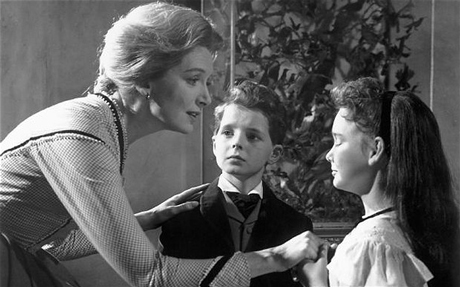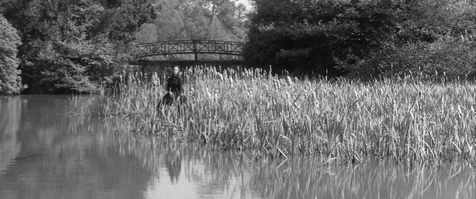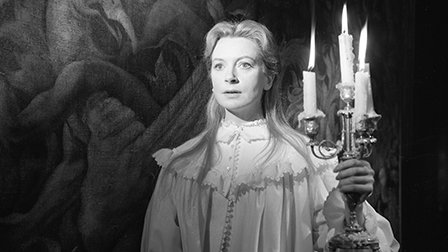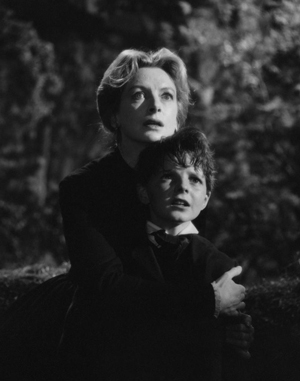Reviewed by Glenn Erickson
Jack Clayton's The Innocents has received more than its share of praise and admiration over the years. The beautifully constructed adaptation of Henry James' ghost story is near the top of the all-time list of sophisticated horror pictures. The previous year's Psycho now gets all the attention, and it's true that Clayton's film appeals more to audiences that wouldn't attend an average horror movie. But who's to say that there's something wrong in transcending the general run of exploitation efforts intended for undiscriminating drive-in audiences. The Innocents is one of the best-photographed movies ever in B&W CinemaScope, and its reputation as a literate, intellectual chiller has grown with the years. Horror aficionados have exhausted millions of words debating the nature of its upscale ghosts.
Fox never had much respect for their movie. After initial engagements its ads adopted the tone of normal exploitation product. For its tardy DVD release, Fox put it out as a Halloween promotion, instead of placing it in its Studio Classics line. A dazzling Blu-ray was released in Region 2 several years ago, and now Criterion has snagged a beautiful HD transfer for a U.S. debut.

The "Uncle" (Michael Redgrave) hires Miss Giddens (Deborah Kerr) to serve as governess for Miles and Flora, his orphaned nephew and niece (Martin Stephens & Pamela Franklin), His only instructions are to take charge and not bother him, under any circumstances. He has no plans to every visit the sprawling country estate where they live. Miss Giddens is at first quite pleased but finds herself at a loss to deal with the two precocious and secretive children. Miles has a habit of using untoward compliments to deflect inquiries about his dismissal from boarding school. From the maid Mrs. Grose (Megs Jenkins), Miss Giddens learns that the previous governess Miss Jessel (Clytie Jessop) carried on a sordid affair with the gardener Peter Quint (Peter Wyngarde). Both of them died under mysterious circumstances. Soon Miss Giddens becomes certain that the children are possessed by evil, especially when she sees the ghostly Jessel and Quint peering through windows, seemingly 'guiding' the children's play.
Plenty has been written about The Innocents in film criticism, as it presents the perfect opportunity to compare a known classic novel with a superior film adaptation. Jack Clayton, cameraman Freddie Francis and actress Deborah Kerr attempt to fully translate the book's complex haunting situation. The existence of the ghosts is made ambiguous -- are they real, or are they merely figments of Miss Giddens' imagination?
The novel was a carefully modulated work of prose that took great pains to avoid being specific about the question of whether or not actual ghost are involved. Miss Giddens may be a sick woman producing the phantoms out of her own mind. There are hints that her pious background has left her sexually suppressed, but it's also possible that her alarm at 'losing control of the children' is an outgrowth of inexperience and insecurity. The writer of a book can exercise complete control over what we "know" about people and situations. The haunting can indeed be handled in an ambiguous manner.
As beautifully made as the movie is, it reduces the mystery to a study of morbid psychology and self-generated hysteria. Screenwriters William Archibald, John Mortimer and Truman Capote leave little room for ambiguity, as their Miss Giddens is a sexually frustrated woman from the get-go. Her very first statement in the interview with The Uncle is to affirm that she indeed has an active imagination. She's obviously flattered by The Uncle's trifling compliments and perhaps imagines that this assignment will be the beginning of a great romance between them, as in a woman's novel. In other words, Miss Giddens seems primed to 'lose control' of both the children and herself.

Miss Giddens relates to the spirited Flora well enough but she's completely unequal to the task of dealing with Miles. The preternaturally mature Miles evades her questions with deft flattery and misdirection and speaks in an abnormally adult tone. His smirking inferences to things unsaid are wholly adult and unnervingly precocious. Miles toys with Miss Giddens, as an arrogant man might intimidate a weak-willed woman with a conquest in mind. For her part, Miss Giddens backs down like a schoolgirl and caves in to Miles' every ploy. She accepts his veiled domination and makes excuses for his confidence tricks. Miles is straight from James' story, but Martin Stephens' performance gives this character a persuasively perverse quality. Reaching to shake hands with his governess, Miles instead slaps a piece of gelatin, and laughs. In this specific context the gesture is obscene - it's as if he's playing with her, with the gelatin standing in for her breast. It's not a gross exaggeration, because many kids are perfectly capable of intuiting and exploiting the weaknesses of adults.
The discussions on the disc by Sir Christopher Frayling cite subjective and objective camera angles that 'prove' that the ghosts are Miss Giddens' subjective psychological phantoms. Frayling says that every stylized ghost sighting is preceded by a shot of Deborah Kerr first 'looking', implying that Giddens is creating the illusions by subconscious will. But even as Frayling says this in the featurette, we see a scene where Giddens sees Quint while behind some curtains. Quint appears first to us, before Giddens looks in his direction.
True enough, every time Giddens sees a ghost Clayton and Francis add eerie layers of stylization -- filters, distorted audio, tricks with dollies and step-printed pigeons. Quint is portrayed as a wanton brute with a cruel look on his face. Jessel is an emaciated spectral victim. Giddens 'sees' Quint before she hears his full story or even knows that he might be there. All the filmic indications point to a purely psychological interpretation: Miss Giddens is a frustrated spinster who goes quietly hysterical when contemplating the unthinkable, the possible exposure of the children to adult sex acts. She herself is repressed and sex obsessed. If there's any doubt of this, Giddens' final passionate kiss dispels it: the woman is 'round the bend.
Of course, maybe Miss Giddens is only very, very concerned and sincere. Maybe she kisses Miles because she has some notion it might make him wake up. The problem with the ghost angle is that, if true, the whole story would be much less interesting. Ghosts show up, hysterical woman tries to exorcise a possessed child, the ghosts retaliate, end of story. But reading what actually occurs on the screen, especially the kiss, Miss Giddens is a neurotic unable to take the pressure of responsibility. She may not be insane, but she's susceptible to hysterical delusions.

Whichever way one feels about the ghosts, The Innocents is a highly pleasurable suspense story. It's an exceedingly handsome production, the kind of movie in which every shot impresses. The spooky stuff is intense. The nasty material with beetles crawling out of statues and Miles' adult behavior efficiently insists on profane ideas without showing them (unless I'm projecting my own perversity). These sublimated obscenities are balanced by several double lap dissolve time transitions done in the elegant style of Val Lewton's Bedlam. Lewton or Mark Robson came up with the idea of introducing a third visual element in dissolves between scenes to create a thematic motif. In Bedlam the in-between images are Hogarth paintings. The outgoing scene dissolves to the painting and then immediately continues to dissolve to the incoming scene. The painting is on the screen by itself for only a frame or two. One highly effective transition of this kind in The Innocents uses a large white rose. Suspended within the double dissolve for at least eight or nine seconds, it becomes a diversion of its own, a little poem. Another very long multiple-element dissolve montage may be the most elegant thing of its kind ever done. Technically it's amazing -- not one speck of dirt, scratch or grainy element is visible in all the overlapping shots.
Deborah Kerr interprets Miss Giddens' nervous and over-imaginative nature with consummate skill. She's in almost every scene, building the character's growing state of anxiety in carefully measured increments.
The children are disturbing and sometimes unnerving presences. The Innocents takes a perverse point of view when it encourages us to join Miss Giddens in imagining the obscene little secrets they might be sharing in private. The real ambiguity in the film is with the kids -- are their snickering conspiracies just child's play or evidence of perversity? Young Pamela Franklin (The Prime of Miss Jean Brodie) is very good at projecting this mystery of childhood. Martin Stephens was the emotionally ruthless alien child in the previous year's Village of the Damned. Here he is either the most powerful child actor ever, or was patiently provoked to give an alarmingly precise range of emotions in a concentrated space of time -- guilt, sneering contempt, anger, defiance, panic. An adult specialist may have over-dubbed Stephen's vocal performance but his little face shows he's acting up a storm. (Note, 9.23.14: this has been cleared up -- see footnote 2 )

Why shouldn't the children be emotionally confused? Their parents are dead and their neglectful Uncle has callously absented himself from their lives, like Jehovah turning his back on Adam and Eve. Miles' evasions and petty crimes would seem an obvious result of this situation, which Giddens prefers to ignore. Miles is his own man, and has to get along in a cruel world -- he attends a British boarding school, for cripe's sake. If the school is like the one in If...., his weirdness is wholly accounted for.
Cinematographer Freddie Francis outdoes himself. The great gray mansion is a warren of fine details, and the sharp lenses invite us to find clues in the corners of rooms or hiding in the hedges and marsh grass. Many shots hold Miss Giddens in a close-up on one side of the frame while an important event happens (or she imagines it happens) on the other. The only hindrance is that the lenses used appear to give close-up faces a slight case of the CinemaScope 'mumps'. 1
The Innocents exploits its soundtrack better than any horror film to that date. An eerie song sets the mood, but pregnant silences are also employed. A lamenting tune sung by a solitary voice precedes the Fox logo and plays like a haunting overture in a minor key. By the time we hear Miss Giddens' whimpering cries behind the titles, we're completely won over.
Jack Clayton's movie reportedly didn't do that well in the theaters. It didn't start any new trends in upscale screen horror, but its reputation has grown with the years. Nicole Kidman's The Others is almost a remake of The Innocents, at least in tone. Kidman's derivative performance channels not Ms. Kerr, but Grace Kelly.
The Criterion Collection's Blu-ray of The Innocents will impress lovers of fine B&W cinematography. Freddie Francis' camerawork seems uncommonly sharp even for an HD transfer. The monaural soundtrack is just as well encoded, enabling us to analyze the subtle effects used to make the film's ghostly sequences seem 'uncanny'.
Criterion found little or no older research materials on The Innocents or producer/director Jack Clayton. The extras compensate with new featurettes. From the BFI's 2006 disc comes an introduction by Sir Christopher Frayling, filmed on the film's original location. Frayling makes the most of the scenery and puts a lot of drama into his lecture. Frayling also provides a feature commentary that delves deep into the subject.
Another new interview piece uses more video recorded in 2006, with the late Freddie Francis, editor Jim Clark and script supervisor Pamela Mann Francis. Even more enjoyable is a separate new interview with cinematographer John Bailey, who analyzes visuals from the film and gives a good overview of Freddie Francis's work. The film's original trailer reveals the 'shock sell' technique that seems so inappropriate for this particular picture; Maitland McDonagh's insert flyer essay mentions the studio's unease with the theme of sexually precocious children, and takes a good look at the director's career.
On a scale of Excellent, Good, Fair, and Poor,
The Innocents Blu-ray
rates:
Movie: Excellent
Video: Excellent
Sound: Excellent
Supplements: commentary and video intro by Sir Christopher Frayling; interview with John Bailey re: Freddie Francis; 2006 making-of interview featurette with crew members Freddie Francis, Jim Clark and Pamela Mann Francis; Trailer; insert essay by Maitland McDonagh.
Deaf and Hearing-impaired Friendly?
YES; Subtitles: English
Packaging: Keep case
Reviewed: September 17, 2014
Footnote:
1. Oddly, The Innocents was filmed with the newer, improved 'Scope equipment; the earlier CinemaScope lenses were even worse when it came to field distortion. I attended an AMIA screening that compared the old lenses to the new, using projected clips from The Innocents and the 1958 The Fly. The older color movie kept its performers a minimum distance from the camera and was flat-looking overall. In The Innocents Clayton and Francis are forever composing in depth and blocking action so that the actors circle around each other, constantly changing their distance from the camera. And most of it remains as sharp as a tack. Cameramen tend to admire this movie a great deal.
Return
2. Talk about a correction from the source... ex-child star Martin Stephens wrote (9.23.14) to assure me that he indeed supplied the voice for his role in The Innocents, and definitely was not dubbed. I'd have to guess that his own voice was also used for the eerie David Zellably of the classic Village of the Damned, since the characers sound so similar. Mr. Stephens maintains an interesting personal website where one can see amusing pictures of himself and his fellow part-alien children visiting the village exterior for the famous science fiction film. They don't look quite so sinister now, 54 years later.
Return

Text © Copyright 2014 Glenn Erickson
See more exclusive reviews on the Savant Main Page.
The version of this review on the Savant main site has additional images, footnotes and credits information, and may be updated and annotated with reader input and graphics.
Return to Top of Page
|

